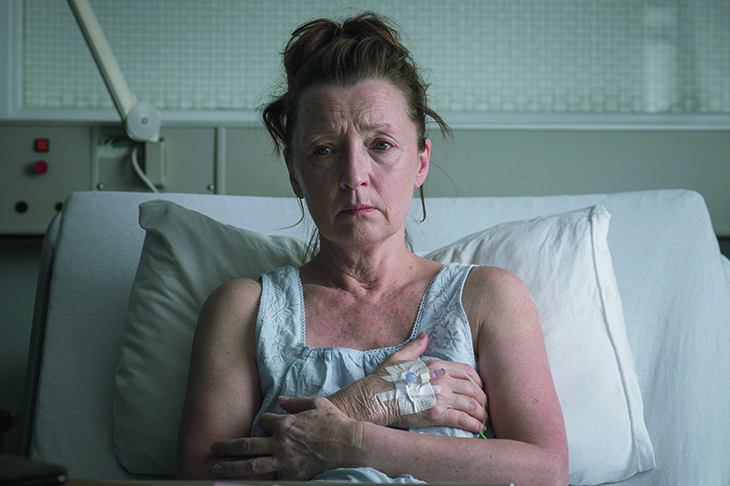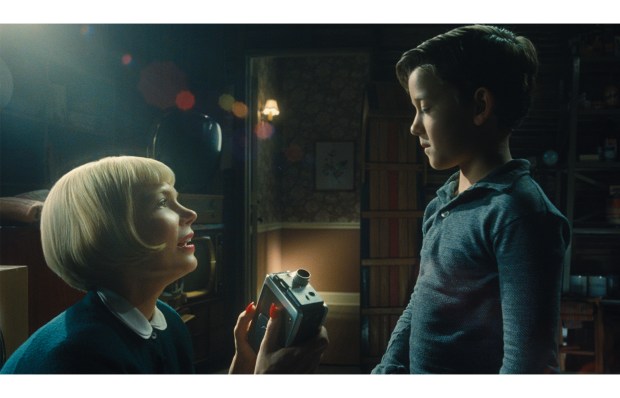Ordinary Love stars Lesley Manville and Liam Neeson as a long-married couple whose lives are disrupted when she is diagnosed with breast cancer. Not very Christmassy, you might think, but it’s not a ‘cancer story’, as has been said in some quarters, it’s a love story, told profoundly and beautifully and honestly rather than cloyingly or sentimentally. Chances are, it may even stay with you longer than any Richard Curtis film. I can’t guarantee it, but am quietly confident this will be so.
The screenplay is by the Northern Irish playwright Owen McCafferty whose own wife, Peggy, underwent breast cancer treatment, and the film is directed by Lisa Barros D’Sa and Glenn Leyburn. Set in Belfast, it takes us from one Christmas to the next, with Manville playing Joan and Neeson playing Tom and first things first: how often do you see middle-aged love stories on screen? Almost never, so in its way this is quite radical. What’s more, Joan and Tom are still loving and have sex and everything (imagine!) and although they’ve experienced a great sadness (as we later discover) their world is now each other and they are content with that.
They have their routines, like their brisk evening walk, and they still make each other laugh as when they’re in the supermarket and she teases him about his tomato-juice habit. ‘Can’t you just eat more tomatoes?’ Their lives are not exciting. The addition of Worcester sauce to their lunchtime soup is an event. But all this lived-in comfort and ease is shattered when she is in the shower and discovers a lump in her breast.
Joan undergoes a year of treatment. Surgery, chemo, the works. The cancer nurses and technicians are all real cancer nurses and technicians so that all feels true, as does so much else. When Joan’s diagnosis has yet to be properly made and the doctor says that on a scale of one to five, the chances of it being cancer is three, they bicker about what this means. Tom says three is closer to one, which means she’s in the clear. She says no, it’s closer to five, which means she has it for sure. And you just know it’s what you would think, if it were you, and what you would say if it weren’t. Heck, I have been there, one way or another — hasn’t everyone? — and this is exactly where your mind goes.
Their love isn’t tested, as it’s plainly here to stay. Instead, this is about the coping and the pain and the fear and the shoring up; and being side-by-side but also alone. At one point they lose their tempers with each other. ‘We are both going through this,’ he shouts. ‘We are not. I am going though this,’ she rages. They are both right, of course. Other moments are purely tender. ‘I never liked your hair anyway,’ he jokes, when she loses it all. There’s also a sex scene where they say goodbye to her breasts, in effect. This is raw, and devastating, but also deeply moving and surprisingly erotic. I have seen nothing like it at the cinema ever.
The film is directed sensitively, so it never feels exploitative, and the lighting is beautiful, with the warm brown glow of their home contrasting sharply with the cold blues and whites of the hospital. And the performances are powerhouse performances, Manville’s especially. How she can convey deep, complex emotions with just a twitch of a lip, I don’t know. It’s miraculous. Neeson has the lesser role and towers above her physically but his Tom can be small and vulnerable and frightened. I’d forgotten, actually, how excellent Neeson can be when he isn’t otherwise occupied with killing bad guys or fighting wolves. (The action here doesn’t amount to more than Tom driving his old VW very slowly while fretting about hospital parking fees.) The pair have terrific chemistry.
My only reservation is the subplot concerning the one other major character in the film, a teacher who also has cancer, that doesn’t seem necessary and is cloyingly sentimental. But otherwise this is as near as damn it to what it’s like when your life is disturbed by cancer and as for those terrible, hot, itchy synthetic wigs the NHS give you? They can make excellent tea cosies. So you learn that too.
Got something to add? Join the discussion and comment below.
Get 10 issues for just $10
Subscribe to The Spectator Australia today for the next 10 magazine issues, plus full online access, for just $10.
You might disagree with half of it, but you’ll enjoy reading all of it. Try your first month for free, then just $2 a week for the remainder of your first year.














Comments
Don't miss out
Join the conversation with other Spectator Australia readers. Subscribe to leave a comment.
SUBSCRIBEAlready a subscriber? Log in